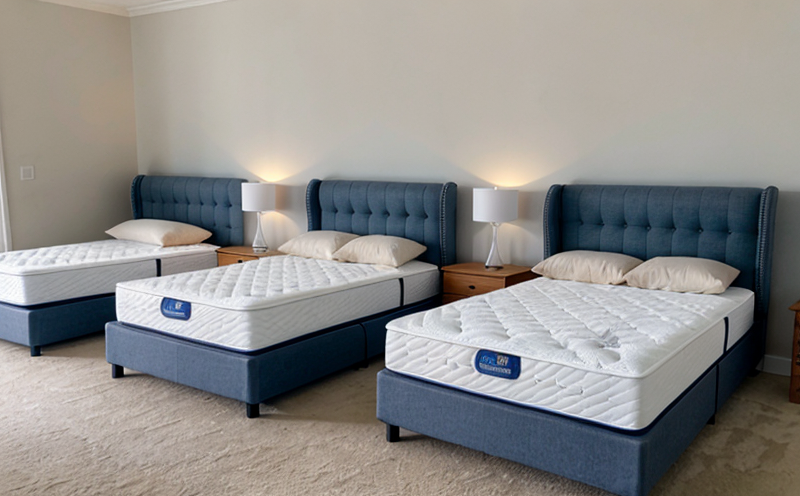Beds & Mattresses Testing
The testing of beds and mattresses is a critical component in ensuring consumer safety, comfort, durability, and compliance with international standards. This process involves a series of tests that evaluate various aspects such as structural integrity, resilience, durability, chemical content, and potential allergens. The goal is to provide consumers with high-quality products that meet both industry requirements and regulatory guidelines.
The testing lab specializes in a range of services aimed at verifying the performance characteristics of beds and mattresses. These tests can be broadly categorized into two main groups: physical performance assessments and chemical and safety evaluations.
- Physical Performance Assessments: This includes tests like static load deflection (SLD), dynamic performance, and durability under stress. SLD is a key measure that indicates how much a mattress will compress under a specified weight. It helps in understanding the comfort level of the mattress.
- Chemical and Safety Evaluations: This ensures that mattresses do not contain harmful substances such as formaldehyde or heavy metals, which can be detrimental to health. Other tests include flammability testing and allergen content checks.
The tests are conducted using advanced equipment calibrated according to international standards like ISO 8923:1996 (Standard Test Method for Determining Load Deflection of Mattresses) and EN 757, which provides requirements for the flammability of textiles used in upholstered furniture. The lab ensures that all tests are conducted under controlled conditions to provide accurate and consistent results.
For R&D engineers and quality managers, these tests offer valuable insights into the performance of new products or modifications. They can use this data to optimize product designs for better comfort and longer life. Compliance officers benefit from these tests as they help in ensuring that products meet local and international regulations, thereby minimizing legal risks.
Bedding manufacturers often rely on these services to ensure their products are up-to-date with the latest industry trends and consumer expectations. By investing in rigorous testing, they can build a strong reputation for quality and reliability, which is crucial for maintaining customer trust and satisfaction.
Why It Matters
The importance of beds and mattresses testing cannot be overstated, as these products play a significant role in our daily lives. A well-tested mattress ensures not only comfort but also longevity, which contributes to the overall quality of life for individuals and families.
- Consumer Safety: Ensuring that beds and mattresses do not contain harmful chemicals or materials reduces the risk of potential health hazards.
- Durability: Tests help in identifying the durability of a mattress, ensuring it can withstand regular use without significant wear and tear over time.
- Comfort: Comfort is subjective but quantifiable. Testing helps manufacturers fine-tune their products to meet specific comfort levels as defined by SLD standards.
- Regulatory Compliance: Meeting international standards ensures that the product can be sold in various markets without facing legal issues.
The testing process also fosters innovation within the industry. By identifying gaps and areas for improvement, it encourages manufacturers to develop better products. This continuous improvement cycle is vital for maintaining competitive advantage and customer satisfaction.
Moreover, these tests contribute positively to environmental sustainability by promoting the use of safer materials and encouraging practices that reduce waste and pollution. Testing helps in identifying eco-friendly alternatives that can be used in manufacturing processes without compromising on quality or performance.
Quality and Reliability Assurance
The testing lab adheres to strict protocols to ensure the accuracy and reliability of its test results. Each mattress undergoes a series of rigorous tests, including static load deflection (SLD), dynamic performance assessment, flammability testing, and chemical analysis for harmful substances.
- Static Load Deflection: This test measures how much a mattress compresses under a specified weight. It is crucial in assessing the comfort level of the mattress by ensuring it provides adequate support without excessive sinking.
- Dynamic Performance Assessment: This involves testing the resilience and durability of the mattress over time, simulating real-world use to evaluate long-term performance.
- Flammability Testing: Ensures that the materials used in the mattress meet stringent fire safety standards, protecting users from potential hazards.
- Chemical Analysis for Harmful Substances: This test checks for the presence of harmful chemicals such as formaldehyde and heavy metals. Compliance with these tests is essential to ensure product safety and environmental friendliness.
The lab uses state-of-the-art equipment calibrated according to international standards, ensuring that all tests are conducted under controlled conditions. The results are reported in a detailed manner, providing comprehensive insights into the performance characteristics of each mattress tested.
By adhering to these protocols and using advanced technology, the testing lab guarantees accurate and reliable test results. These results are crucial for manufacturers, distributors, and retailers who rely on them to make informed decisions about their products.
Environmental and Sustainability Contributions
The beds and mattresses testing services provided by this laboratory play a vital role in promoting environmental sustainability. By ensuring that products meet stringent safety and quality standards, the lab contributes significantly to reducing waste and pollution associated with substandard or unsafe products.
- Eco-Friendly Materials: The tests help identify materials that are safer for consumers while being environmentally friendly. This promotes the use of sustainable resources in manufacturing processes.
- Reduced Waste: By ensuring product durability and quality through rigorous testing, there is a reduction in the need to replace products prematurely, thereby minimizing waste generation.
- Pollution Prevention: Ensuring that mattresses do not contain harmful chemicals reduces the risk of these substances being released into the environment during manufacturing or disposal.
The lab's commitment to environmental sustainability is reflected in its use of energy-efficient equipment and practices. By reducing the carbon footprint associated with testing, it supports a greener future for all stakeholders involved in the furniture industry.
Through these efforts, the laboratory contributes not only to the well-being of consumers but also to the health of our planet by promoting sustainable practices within the industry.





